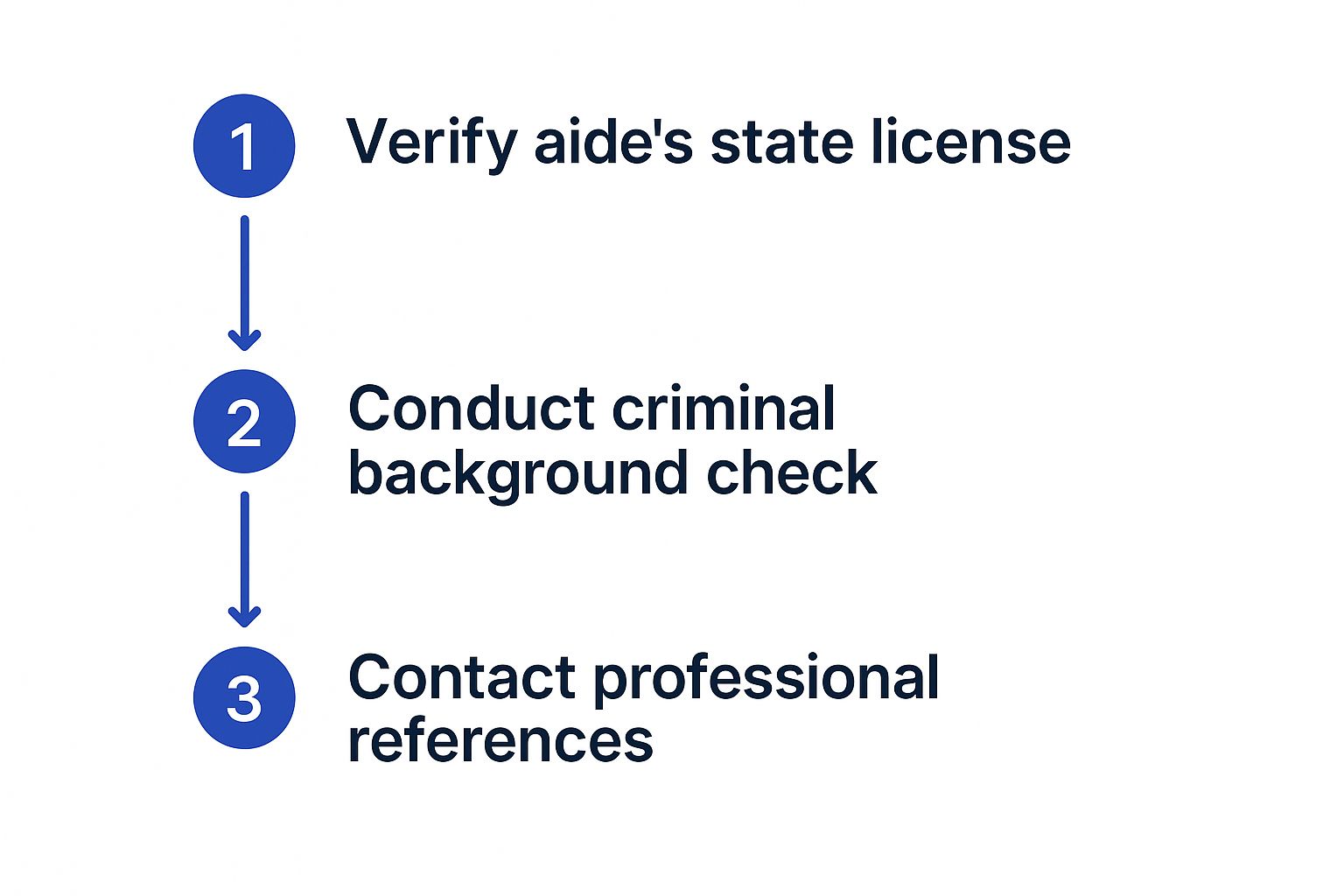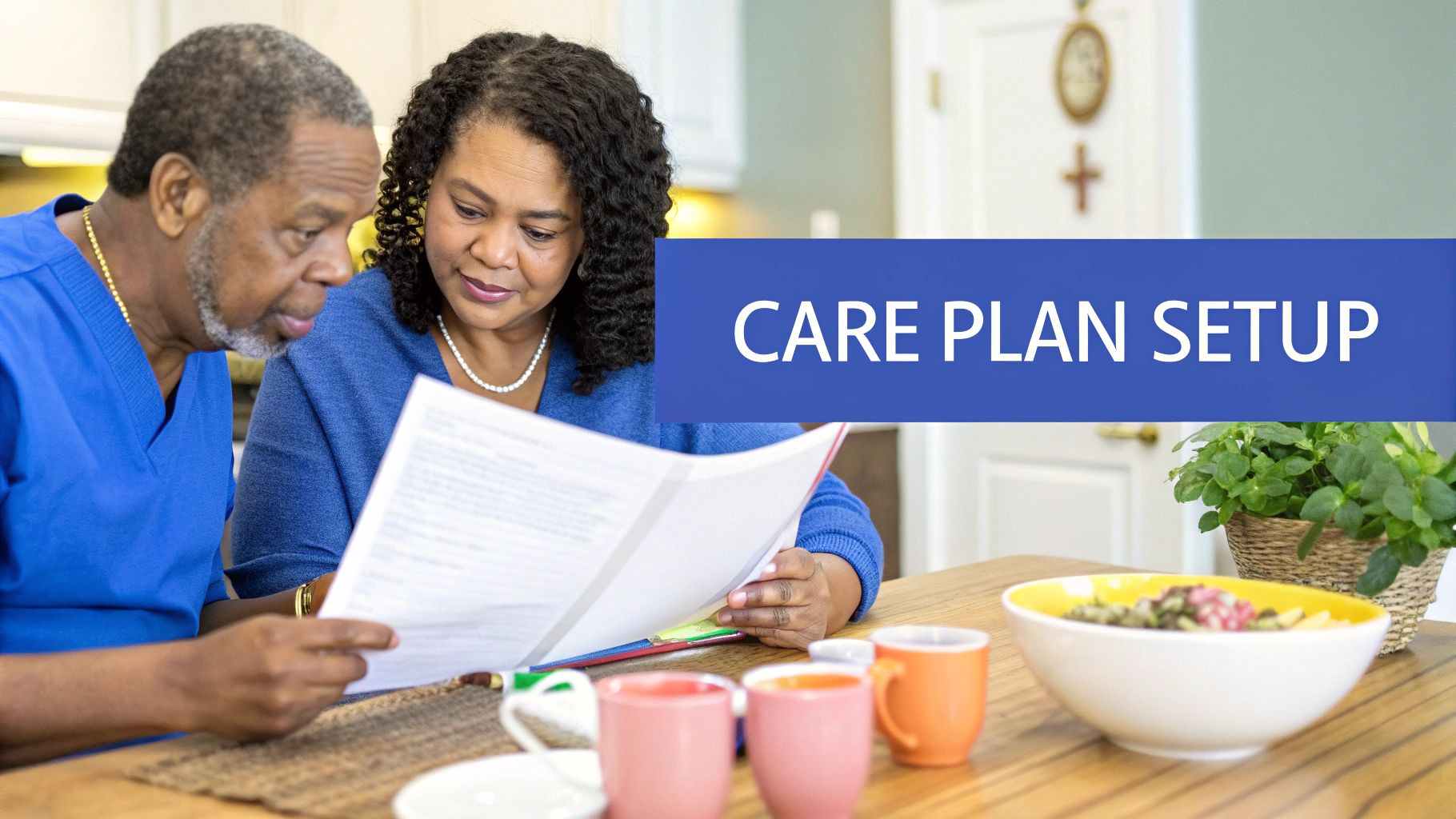Getting started with a home health aide isn't about just "needing help." It's about creating a clear, actionable care plan based on your loved one's specific needs. This is the single most important step.
Nailing this down from the start saves you a world of headaches later. It involves looking at everything from medical requirements and personal care tasks to daily routines and even social preferences. Getting this right ensures you find someone with the right skills from day one.
Defining What Your Family Actually Needs
Before you even think about posting a job or calling an agency, you have to create a detailed picture of what support really looks like. This isn't just a simple list of tasks; it’s the blueprint for your loved one's well-being and your own peace of mind.
Trust me, a vague job description is a surefire way to end up with a mismatched caregiver. Clarity is your greatest asset here.
Start by just observing. Watch your loved one for a day or two and take notes. What are the specific challenges you see? Don't just write down "needs help in the morning." Get granular. "Has trouble safely getting out of bed, needs steadying. Requires help buttoning his shirt. Needs a verbal reminder to take his blood pressure pill before breakfast." That's the level of detail you're aiming for.
Breaking Down the Care Requirements
To build a truly complete needs assessment, it helps to organize your thoughts into a few key categories. This framework ensures you don't overlook anything critical and helps you explain the role clearly to potential candidates.
Think about these core areas:
- Personal Care: This is the hands-on stuff—the Activities of Daily Living (ADLs). Think bathing, grooming, getting dressed, and using the toilet. Note how often and what level of support is needed for each.
- Medical Support: Are we talking simple medication reminders? Or more involved tasks like monitoring blood sugar, changing a bandage on a wound, or helping with prescribed physical therapy exercises? Be specific.
- Mobility Assistance: How do they get around? Do they need help moving from the bed to a chair? Do they use a walker? Fall prevention is a massive concern, as falls are a leading cause of injury for adults 65 and older, so this area is critical.
- Household Management: This is all about keeping the home running smoothly. It can include meal preparation, light housekeeping (like tidying the kitchen and doing laundry), and maybe grocery shopping.
- Companionship and Social Needs: Don't underestimate this one. Loneliness can have a huge impact on a person's health. Does your loved one need someone for conversation, to play a game of cards with, or to drive them to appointments and social outings?
For example, a family might think their father with early-stage dementia just needs someone to make his lunch. But after a real assessment, they realize he actually needs a caregiver who can engage him in memory games, ensure he doesn’t wander, and provide patient, consistent emotional support when he gets confused. That's a very different skillset.
Looking Beyond the Physical Tasks
A thorough assessment has to go deeper than just physical needs. What’s your loved one’s cognitive and emotional state?
Are they dealing with memory loss? Do you see signs of depression or anxiety? Someone with cognitive decline needs a caregiver with a totally different approach—one built on patience, specialized communication, and constant supervision.
Getting this right transforms the care plan from a simple checklist into a truly supportive partnership. It’s what makes the difference between just having a helper in the house and having a professional who genuinely improves your loved one’s quality of life.
Budgeting for In-Home Care and Finding Funding

Let’s talk about the elephant in the room: money. Figuring out the finances for in-home care can feel like the biggest hurdle of all. To make this work long-term, you need a clear-headed approach and a solid plan.
The first big decision you'll make is whether to hire through an agency or find an aide directly. An agency handles the heavy lifting—payroll, taxes, insurance, and background checks—but that convenience comes at a higher hourly rate. Going the direct-hire route might seem cheaper upfront, but remember, you become the employer. That means you're on the hook for everything.
Calculating the True Cost of Care
To get a real sense of the budget, you have to look past the base hourly rate. Will you need care on weekends or overnight? Those hours almost always cost more. You also need to be aware of your state’s specific overtime laws for domestic workers, as they can have a big impact.
Here are the key financial pieces to factor into your budget:
- Hourly Rates: As of May 2024, the national average for a home health aide is around $17 per hour. This number can swing pretty dramatically depending on where you live and the aide’s level of experience. You can dig deeper into the home care workforce statistics on McKnightsHomeCare.com.
- Agency Fees: If you use an agency, their fee is typically baked into the hourly rate. Still, it's a good idea to ask for a complete breakdown so you know exactly what you're paying for.
- Overtime Pay: If your aide works more than a standard 40-hour week, you’ll most likely be required to pay overtime.
- Taxes and Insurance: This is a big one for direct hires. You’re responsible for withholding and paying all payroll taxes, plus securing workers' compensation insurance to protect both you and your aide.
Exploring Payment and Funding Options
Once you have a realistic cost estimate, the next question is how to pay for it. Many families jump to the conclusion that this will be an entirely out-of-pocket expense, but there are often other avenues for financial help that can make a huge difference.
It’s so important to investigate every potential source of funding. The eligibility rules can be tricky, but you might be surprised by what's available.
Don't assume you won't qualify for assistance. Programs like Medicaid have specific waivers for in-home care that operate under different rules than their standard health coverage. It’s always worth checking.
Here are the most common places to look for funding:
- Long-Term Care Insurance: If your loved one has a policy, this is your first stop. Pull out the documents and get familiar with the details: the daily benefit amount, the "elimination period" (how long you pay out-of-pocket before coverage starts), and exactly what types of care are covered.
- Medicare: This is a common point of confusion. Medicare typically only covers short-term, intermittent skilled care at home, usually after a hospital stay. It does not pay for long-term personal or companion care.
- Medicaid: For seniors with limited income and assets, Medicaid is often the primary source of funding for long-term home care. This is usually managed through state-specific Home and Community-Based Services (HCBS) waivers.
- Veterans' Benefits: The VA has some fantastic programs, like Aid and Attendance, which can provide a monthly pension to help cover home care costs for qualified veterans and their surviving spouses.
Finding and Vetting Qualified Caregivers

Now that you have a clear plan and a budget in mind, it’s time to start the search for the right caregiver. The first big decision you'll make is whether to hire an aide directly or work with a home care agency. Each approach has its own set of benefits, and the best choice really boils down to your family’s comfort level and how much time you can dedicate to the process.
Going with an agency takes a lot of the administrative work off your plate. They handle the recruiting, screening, insurance, and payroll for their caregivers. This route offers a real safety net, including providing backup care if your primary aide is unavailable. On the other hand, hiring a home health aide directly gives you more control over the selection process and can often be less expensive per hour—but it also means you become the employer and take on all those responsibilities.
Sourcing Your Candidates
If you opt for an agency, they'll present you with a selection of pre-vetted candidates to choose from. But if you’re hiring directly, you’ll need to be more hands-on.
Your best starting point is often your personal network. Ask friends, colleagues, or neighbors for referrals. People who have already navigated this process are one of your most valuable resources for finding trustworthy candidates.
Beyond your immediate circle, various online platforms are designed to connect families with caregivers. These websites can be fantastic for finding potential aides, but remember that you'll be responsible for doing all the vetting yourself.
No matter which path you take, the goal is to build a strong pool of qualified applicants. Don't rush this stage—the effort you put into your search now will directly impact the quality of care your loved one receives.
Crafting a Job Description That Attracts the Best
A clear, detailed job description is your single most important tool for attracting the right people. This is where all the work you did during your needs assessment really shines. Instead of posting a generic ad, use the specific details you've gathered to paint an accurate picture of the role.
A strong job description should include:
- A Summary of the Role: Briefly introduce your loved one and the kind of support they need.
- Specific Duties: Clearly list the required tasks, from personal care and meal prep to running errands and providing transportation.
- Required Qualifications: Be specific about any necessary certifications (like HHA or CNA), experience with certain conditions (like dementia), or if a valid driver’s license is a must.
- Schedule and Compensation: Be upfront about the required hours, days of the week, and the pay rate you're offering.
This level of detail not only draws in qualified candidates but also helps weed out those who aren’t a good fit right from the start. With an aging population driving the need for around 1.6 million new aide positions by 2026, a well-written job post will make your opportunity stand out. You can dive deeper into healthcare employment projections and their drivers in this report.
Once the applications begin to arrive, it’s a good idea to conduct quick phone screenings. This is an efficient way to narrow down your list before committing to in-person interviews and helps you get a preliminary feel for a candidate’s personality and confirm their qualifications.
Interviewing Candidates and Verifying Credentials
You’ve sorted through the applications and have a shortlist of promising candidates. Now comes the most important part: the interview. This is your chance to get a real sense of the person behind the resume, the individual who might become a trusted part of your loved one's daily life.
The goal here isn't just to confirm their skills but to understand their personality, their approach to care, and how they handle real-world challenges. A piece of paper can tell you they have dementia care experience, but only a conversation will reveal how they'd patiently manage a moment of confusion or agitation.
Asking the Right Questions
Forget the standard interview questions. To truly understand a candidate's competence and character, you need to dig deeper with questions that put them in realistic situations.
Instead of questions that can be answered with a simple "yes" or "no," try framing your prompts to get more insightful responses:
- Scenario-Based: "My mother sometimes refuses to take her medication. How would you approach that situation?" This kind of question reveals their problem-solving abilities and patience under pressure.
- Experience-Focused: "Can you tell me about a time you cared for someone with significant mobility challenges? What were the specific things you did to ensure their safety and prevent falls?" This gets to the heart of their practical, hands-on experience.
- Communication Style: "How do you typically keep families updated on their loved one's day? What would your process be for letting me know about any concerns that come up?" This sets clear communication expectations right from the start.
To help you prepare, we've put together a table of essential questions. These are designed to open up a dialogue and give you a clearer picture of each candidate.
Essential Questions for Your Home Health Aide Interview
| Question Category | Sample Question |
|---|---|
| Experience & Skills | "Can you describe your experience with [specific condition, e.g., diabetes, post-stroke care]?" |
| Problem-Solving | "What would you do if my father had a fall while you were on shift?" |
| Personality & Approach | "What do you find most rewarding about being a caregiver? What do you find most challenging?" |
| Reliability & Professionalism | "Can you tell me about a time you had to handle a last-minute schedule change?" |
| Communication | "How would you handle a disagreement or a misunderstanding with a client or their family?" |
| Boundaries | "How do you maintain professional boundaries while still building a warm, trusting relationship?" |
Remember, the interview is a two-way street. It's not an interrogation; it's a conversation to see if there's a good fit for everyone involved.
Due Diligence: Verifying Credentials and Background
You've had a great interview and feel confident about a candidate. That's fantastic! But the next step is absolutely critical for the safety and security of your loved one. Never, ever skip the verification process.
Even with a wonderful first impression, thorough due diligence is a non-negotiable part of hiring a home health aide. This isn't just about ticking boxes; it's about ensuring you're bringing a qualified, trustworthy professional into your home.
The workflow below shows the key checks you need to perform.

Following this order is the most efficient way to vet someone. You confirm their professional qualifications first, before spending time and money on background checks and reference calls.
First, verify any certifications they listed, like a Certified Home Health Aide (CHHA) or Certified Nursing Assistant (CNA). You can usually do this directly through your state's official licensing board or registry. Next, it's time for a comprehensive criminal background check.
Finally, call their professional references—not friends or family. Ask specific questions about their reliability, on-the-job conduct, and skills. Taking these crucial steps provides peace of mind and confirms you’ve made a responsible, informed decision for your family.
Finalizing the Hire: Your Work Agreement and Onboarding Plan

You’ve made it through the interviews and background checks, and you’ve found the right person. That’s a huge accomplishment, but don’t rush the final steps. Now it's time to build a professional foundation that will set everyone up for a successful, long-term relationship.
This is where a solid work agreement comes in. This document is far more than just a formality; it’s a critical communication tool that puts everything in writing to prevent confusion down the road. It makes sure you and your new aide are completely aligned from the very first day.
Relying on a vague verbal understanding is a recipe for trouble. It can easily lead to disagreements over duties, hours, or pay. Formalizing everything protects everyone involved and establishes a tone of mutual respect right from the start.
Crafting a Clear and Comprehensive Work Agreement
Your work agreement should be a detailed, easy-to-read document that covers every aspect of the job. Think of it as the official guide for the role. The more specific you are now, the fewer headaches you’ll have later.
This is your opportunity to clearly define expectations, responsibilities, and of course, compensation. It’s how you turn your initial needs assessment into a concrete set of instructions and shared understandings.
A strong agreement should always include these key pieces:
- A Detailed List of Duties: Go back to the needs assessment you created and list every single task, from personal care and medication reminders to meal prep and specific housekeeping duties.
- The Work Schedule: Be precise. Note the exact days and hours the aide will be working. You should also include details on break times and any expectations around flexibility.
- Compensation Details: Clearly state the hourly pay rate, the overtime rate (if applicable), and how often they'll be paid (e.g., weekly, bi-weekly). It's also smart to outline how payroll and taxes will be handled.
- Policies and Procedures: Cover the important stuff, like your policy for sick days, how to request time off, and the protocol for handling emergencies or sudden schedule changes.
A well-structured agreement is your best tool for retention. When expectations are clear from the get-go, aides feel more secure and valued in their roles—which is essential in an industry known for high turnover.
This clarity is even more critical when you consider the challenges facing the home care industry. The demand for aides is skyrocketing, yet the industry struggles with a turnover rate estimated at nearly 80% in 2024. A professional onboarding process helps fight this by creating a stable, supportive work environment. You can learn more about home health care industry trends and retention challenges to understand the bigger picture.
Ensuring a Smooth Onboarding Process
Once the agreement is signed, the next move is to make the first few days and weeks as seamless as possible. A thoughtful onboarding plan helps your new aide feel confident and prepared, which is the first step toward building a trusting relationship with your loved one.
The first day shouldn't feel like a test. Instead, set aside dedicated time for a structured orientation. Walk them through the home, pointing out where to find everything from medical supplies and important documents to cleaning products and their favorite coffee mugs.
A successful first week usually involves a few key steps:
- A Thorough Home Walkthrough: Go room-by-room to help the aide get comfortable with the environment. Make sure to point out any safety hazards or important equipment, like a walker or oxygen machine.
- Detailed Care Plan Review: Sit down together and go through the care plan line by line. This is your chance to discuss your loved one’s daily routines, their personal preferences, and any specific needs in detail.
- Introduction to Your Loved One: Make the first meeting warm and low-pressure. Allow them some time to just chat and get acquainted without the pressure of jumping straight into care tasks.
- Establishing Communication Norms: Decide how you’ll stay in touch. Will you use a daily logbook? A quick text at the end of each shift? Figure this out now to avoid communication gaps later on.
Common Questions About Hiring an Aide
When you start the journey of hiring in-home care, a lot of questions pop up. It's completely normal. Getting clear answers is the best way to feel confident about your next steps and build a great relationship with your new caregiver.
Let's walk through some of the most common uncertainties families face, from figuring out the different types of caregivers to understanding your duties as an employer.
What Is the Difference Between a Home Health Aide and a Personal Care Assistant?
This is easily one of the most frequent points of confusion, but the distinction is really important. A Personal Care Assistant (PCA) is focused on non-medical, hands-on help. Think of them as a support system for the Activities of Daily Living (ADLs)—things like bathing, getting dressed, preparing meals, and simply being a friendly companion.
A Home Health Aide (HHA) has more formal training and can handle some basic health-related tasks, always under the supervision of a nurse. On top of everything a PCA does, an HHA can often help with:
- Checking vital signs (blood pressure, pulse, temperature)
- Guiding someone through prescribed physical therapy exercises
- Giving reminders to take medication on schedule
- Changing simple bandages or providing basic wound care
So, which one is right for you? It all comes down to your loved one’s specific needs. If the support needed is mostly for daily living and social interaction, a PCA is probably a perfect fit. But if there’s any level of health monitoring involved, an HHA is the safer and more appropriate choice.
What Are My Legal Responsibilities When Hiring an Aide Directly?
This is a big one. When you decide to hire an aide directly instead of going through an agency, you legally become their employer. It’s a serious role that comes with specific financial and legal duties you absolutely can't overlook.
Getting this part wrong can lead to some hefty legal and tax penalties down the road. You need to be ready to manage payroll, taxes, and insurance from the very beginning.
When you take on the role of an employer, you're responsible for everything an agency would normally handle. That means paying employer taxes, getting workers' compensation insurance, and following all state and federal labor laws on wages and overtime.
Here are the key duties you'll be responsible for:
- Payroll and Taxes: You'll need to withhold and pay taxes for Social Security, Medicare, and unemployment. At the end of the year, you must provide your aide with a W-2 form, not a 1099.
- Workers' Compensation Insurance: This is mandatory in most states. It’s designed to protect both you and the aide by covering medical bills and lost wages if they get injured while on the job.
- Following Labor Laws: You have to play by the rules. That includes meeting minimum wage requirements and paying overtime for any hours worked beyond the standard weekly threshold.
How Do I Manage and Communicate with Our Aide Effectively?
Building a great working relationship really comes down to clear, respectful communication. You're aiming for a partnership built on trust, where your family and the aide both feel heard and respected.
It's best to set up clear ways to communicate right from the start. Something as simple as a daily logbook or a shared digital note on your phone can be a fantastic tool. The aide can leave updates on how the day went, and you can leave instructions or ask questions.
Try to schedule brief, regular check-ins to just talk about how things are going. This gives you a dedicated time to catch any small issues before they snowball into bigger problems. Remember, an open dialogue is the best way to prevent misunderstandings and make sure the care plan keeps up with your loved one’s changing needs.
At NJ Caregiving, we understand that finding the right in-home support is a significant decision. Our team of compassionate and skilled caregivers is dedicated to providing personalized care that enhances safety, comfort, and quality of life for families in Princeton, NJ, and throughout Mercer County. To learn how we can support your family, visit us at njcaregiving.com.



